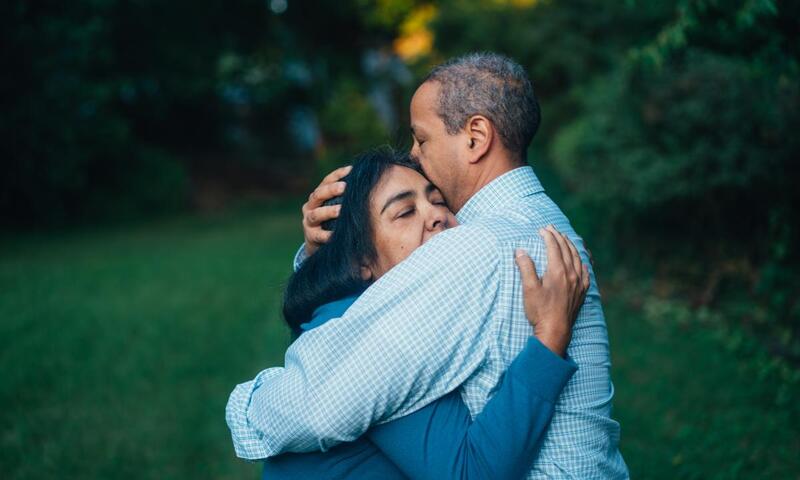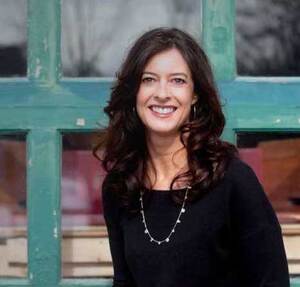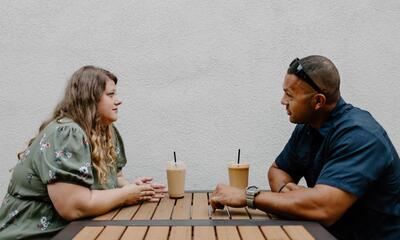How Do I Find Safe Relationships?

Dear CMR,
I've been dating my boyfriend for four months now and think he might be abusive. I was sitting in your Christian Perspectives class and as you described the details of abusive relationships, I realized that I am in one. How could this happen to me without realizing it? I know I need to break up with him, but I'm scared. If I could fall for someone that is abusive once, could I do it again? How do I know if someone is safe before it's too late?
Signed,
Scared to Open Up Again
If you’ve been hurt by a destructive relationship, you are not alone. I am constantly amazed by how often I hear stories such as these:
- A wife who faces the fact that her husband is emotionally abusive
- A loyal person who discovers that her best friend has been manipulating her
- A daughter who finally understands that she’s only loved if she stays quiet
- A single mom who comes to realize she’s been shut out of the church “in-group”
The realization that what you thought was a safe relationship actually isn’t safe leaves you angry and confused. And, it also does something strange for most women. It causes you to doubt yourself. You might find yourself wondering:
- “How did I let that happen?”
- “Did I do something to deserve this mistreatment?”
- “Why didn’t I see that coming?”
No matter how many times you or others remind you that it wasn’t your fault, you can’t help but think to yourself, “What’s wrong with me?”
The truth is that absolutely nothing is wrong with you. Someone exploited one of your vulnerabilities. And, that’s not your fault. Everybody has areas where they’re vulnerable. Everyone can be exploited, betrayed, or hurt. It’s part of what makes you human.
Maybe there were some red flags. Maybe there weren’t. Even if there were, what is so terrible about hope? Children (even adult children) are wired to hope that they can trust their parents. A woman hopes the man she married will be good to her. We all hope that a friend or a church will have our best interests at heart.
What’s so terrible about being someone who hopes that people will behave as they should?
Don’t beat yourself up.
Instead, befriend the tender part of you that got hurt. Get to know it. Often these parts of us are young, innocent, and trusting. That’s exactly as God made them to be. Jesus called them blessed (Matthew 19:14).
Then, make this commitment to yourself: I now know where I’m vulnerable. And, armed with that information, I will do what I can to ensure that part of me does not get mistreated again.
You can’t prevent other people from behaving terribly. But, you can do your part to look after yourself. In fact, you will find safe relationships with other people as you commit to becoming safe for the most vulnerable parts of yourself.
Safe Relationships Start with Yourself
God has equipped you with a built-in system to help you navigate the world around you. This system is embedded in your nervous system – it’s what gives you “fight” or “flight” instincts when someone is about to harm you. It’s comprised of your emotions that register anger and fear. And it involves your thinking capacity to analyze and identify unhealthy behaviors around you. Finally, it’s powered by the Holy Spirit who enters in to the core of your being and helps you discern what is healthy for YOU.
The problem is that most women are not taught how to operate this powerful God-given system. In fact, one of the key tactics used by abusive or toxic people is to teach you *not* to trust yourself. They get in there and mess with the system that God made, causing you to doubt yourself.
Here’s the good news: you can learn how to find safe relationships again. It starts with getting to know your own operating system.
1. Learn to guide your emotions.
Oftentimes, what feels safe to us at first, is not safety at all. It’s hollow. For example, maybe you fell for that guy who said all the right things, only to ditch out. Or, you got taken in by a new friend who made you feel like you’d finally arrived, only to turn on you. You felt over the moon about your charismatic new boss, only to discover that she created a toxic work culture.
Welcome to the power of unharnessed emotions. Don’t get me wrong. Your emotions aren’t the enemy here. But, it’s critical that you understand their power, so that you can guide them to work for you, not the other way around.
Your emotions have been conditioned. That means that your emotions give you a feeling inside based on how you were taught. For example, you might have been conditioned to feel guilt, when you tell someone “No”. Or, you might have been taught that it’s your job to hide who you really are to get love. As a result, you feel fantastic when you please someone else, regardless of how they treat you.
When it comes to relationships, your emotions tend to be linked to your deepest needs that have not been met. For example, if you never received affirmation, parts of you might feel incredibly loved by someone flashy, who says all the right words, even if they don’t treat you very well. It can also work the other way. For instance, maybe you were never taught how to receive constructive feedback. So, you feel angry or hurt when someone is actually being genuine and honest with you in a healthy way.
As a result, your emotions aren’t always your best guide, until you learn to understand them. You don’t want to deny them, and you also don’t want to let them make your decisions for you. Instead, you need to start paying attention to them, so that you can guide them, not the other way around.
2. Check what you feel through reality testing.
As you start paying attention to what you feel, begin to test those feelings against concrete data points. This is where your thinking brain kicks in to work alongside of your emotions. Here are some examples of questions you might ask yourself, without judgment or self-criticism:
- Does that person who flatters you also show up for you consistently?
- If you were to speak up honestly about a preference, how would this person respond?
- What do you tell yourself when they ignore or belittle what you share? (For example, do you assume what you shared was wrong? Or, do you question their character?)
- When you say “No”, do they treat you with respect?
- If you feel guilty in this relationship, what is it that you believe you have done wrong?
- What would you say to a friend who was being treated the way you are being treated? Your daughter?
There are no right or wrong answers to these questions at this point. Your goal is simply to understand yourself better. The process of becoming safe for yourself means starting to pay close attention to how your emotions match up to your beliefs about what is healthy and good for you.
As you engage in reality testing, you might start to test the relationship a bit. For example, you might practice saying “No” or stating a preference. Your goal isn’t to put someone on trial. Instead, it’s about honoring the commitment you made to become safe for yourself. And, in order to do that, you will need to investigate.
3. Slow yourself down.
In order to create safety within, you have to slow yourself down. As you slow yourself down and become more conscious of what you are thinking and feeling, you start to change conditioned patterns of behavior. You begin to move deeper inside yourself, where you can lead yourself well out of the wise place inside where the Holy Spirit lives. This is the place where you are your God-given and truest self. This place inside brings together both the feelings you feel (“but that feels so good!”) and the warning signs you wish you could heed (“those actions aren’t adding up.”) It takes into account both, and helps you negotiate between them.
Slowing yourself down might include:
- setting aside time each morning to journal what you think and feel about a relationship
- asking for help from a trusted friend or counselor as you try to become more aware
- paying attention to cues from your body, such as exhaustion, tension, or knots in your stomach
- being honest with God about fears and doubts you are experiencing.
In order to become safe for yourself and develop the kind of safe relationships that you crave, you have to slow yourself down enough to pay attention to what the most vulnerable parts of you truly need. If the other person is someone you can trust, they won’t rush you. They’ll honor the time that you need.
Above all: Don’t look for the illusion of safety, the “sizzle” of empty words. Instead, look for the “steak” or substance of safety that is marked by honesty, respect, consistent actions, deep self-awareness, and clarity about limitations. This person might not be the “shiniest” one in the room at first. But they will be the one worth keeping.
For Further Reading on Safe Relationships
To learn more about finding safe relationships, please check out “How to Find a Friend Worth Keeping” and “3 Steps to Reclaiming Your Voice in Relationships” as part of my Claim Your Yes New Year’s bundle.


